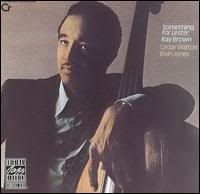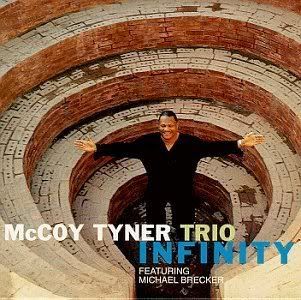 Michael Brecker - Time Is of the Essence
Michael Brecker - Time Is of the Essence1999 - Verve - CBR@256 KB/s
No. 5 - Billboard Top Jazz Albums chart - 1999
REVIEW: Michael Brecker introduced a couple of new wrinkles to his sound on his sixth album, in the form of two new sidemen. Larry Goldings' organ makes for an unusual quartet — also including Brecker on tenor sax, frequent guest Pat Metheny on guitar, and one of three different drummers — in that there is no bass. As a result, Metheny often fills in that role when he isn' t soloing. Goldings' touch is light, in contrast to the more intense playing of Brecker and Metheny. But it is the second new sideman who makes a difference: Elvin Jones guests on drums on three tracks. Brecker had never shied away from announcing his influences, and with Jones behind the traps, especially on the opening track, "Arc of the Pendulum," and the closer, "Outrance" (both Brecker originals), he indulges his affection for John Coltrane, playing freely and aggressively across the rhythm. Jones, who gets a showcase solo in "Outrance," is unmistakable, and his support often makes Brecker sound like Coltrane. With Bill Stewart behind the drums, the group performs "Renaissance Man," a tribute to another major Brecker influence, Eddie Harris, and Brecker unabashedly recalls Harris there. The tunes, five by Brecker, two by Metheny, and one each by Goldings and producer George Whitty, are loosely structured and run from six to ten minutes each, so that the disc runs 70 minutes. Clearly, they could have gone longer: Several of them fade out, sometimes during a Brecker or Metheny solo, an oddity on a jazz album. - William Ruhlmann, AMG
REVIEW: The importance of saxophonist Michael Brecker’s final recording, Pilgrimage, is densely multidimensional. The romantically inclined will attach significance to the fact that the nine compositions were conceived and recorded while Brecker was aware of the gravity of his final illness. Pilgrimage falls into an artistic/musical category that includes such disparate music as Mozart’s Requiem, Puccini’s Turandot, Billie Holiday’s Lady In Satin and Johnny Cash’s American Recordings, Volumes 5 & 6. All of these examples were conceived during the artists' autumnal periods and, in these cases, represent something of pinnacles in their outputs.
High art in the face of destiny is not always the case, however. June Carter Cash’s final Wildwood Flower, while heartfelt, did the singer disfavor because she was obviously ill during the recording. Anita O’Day’s final recording, Indestructible, similarly sincere, was recorded much too far past the singer’s prime, and the aesthetic value of trumpeter Chet Baker’s final recordings remains up for debate. So, what of Michael Brecker’s final output?
In 2005, Brecker was diagnosed with myelodysplastic syndrome, a diverse collection of hematologic disease all sharing in common the inappropriate production of blood cells and their propensities for transforming into acute myelogenous leukemia. Unable to find a suitable stem-cell donor, Brecker passed away on Saturday, January 13, 2007. While Brecker did remain active during the period of his illness, appearing on Beatle Jazz’s With A Little Help From Our Friends and Leni Stern’s Alu Maye (Have You Heard), he had been inactive a year before these recordings.
Thus, the artist’s largest late effort was reserved for Pilgrimage. He is joined by pianists Herbie Hancock and Brad Mehldau, guitarist Pat Metheny, bassist John Patitucci and drummer Jack DeJohnette, all sacred to Brecker’s generation of jazz musicians. The notable absence of Randy Brecker is acknowledged for the life-long collaboration he had with his brother in their various music endeavors. Save that, Brecker chose his group wisely as the results of the recording reveal.
Brecker’s tenor tone is strong and muscular. His composing is the best of his career. His melodic head-lines are organic, approximating a flock of small birds flying scattered one second and then in unison the next. Brecker and Metheny share a Bill Evans-Scott LaFaro empathy throughout the recording, both buoyed by the impressionistic piano of Hancock and Mehldau. The heart of the disc exists in its center with the pieces “Tumbleweed” and “When Can I Kiss You Again.” On the former, Brecker sets up a fast rolling theme and harmonics over which the soloists take quick flight including an aggressively distorted Metheny solo that gives way to one by Brecker. The rhythm section of Patitucci and DeJohnette creates a funky tonk with powerful momentum. No matter what, Brecker is in complete command.
“When Can I Kiss You Again” is Brecker’s introspective lullaby to his children, whom he could not see while in medical isolation. Again, his superior composing provides a carefully complex melodic introduction with a modal concept over which to solo. Composition and improvisation weave in and out of one another; constructing a silken fabric over which Metheny gives one his most inspired and introverted solos. Hancock provides his trademark abstraction as solo, depicting anxiousness as music. Brecker’s solo is middle to low register and impeccably structured (as are all of his solos). The disc’s title cut is a moody, Coltrane-esque meditation over electric piano with bass and drums occupying all sonic spaces. The piece grows in density and freedom as an open improvisation develops over the barest harmonic structure. And that was just the extended introduction. Brecker pulls all involved into an extended obbligato that is serpentine and seamless.
How does history view Michael Brecker? Many consider him to be the most important tenor saxophone player since John Coltrane. This is at the expense of Wayne Shorter, though Shorter generationally overlaps Coltrane. I would come closer to declaring John Coltrane, Wayne Shorter and Michael Brecker the apex of the tenor saxophone since Lester Young, Coleman Hawkins and Ben Webster. That excludes a lot and that exclusion is necessary. Brecker’s importance lies in his universality. When I listen to Oliver Nelson’s The Blues And The Abstract Truth (Impulse, 1961), I think of that music as a jazz soundtrack of the 1960s. It had that sound that listeners would immediately identify as jazz: so with Pilgrimage and the opening of the 21st Century. Michael Brecker’s final recording is a finely crafted jazz soundtrack for a new millennium, serving in honor of the late saxophonist and all of jazz. - C. Michael Bailey, allaboutjazz.com
CreditsMichael Brecker - Sax (Tenor)
Larry Goldings - Organ
Elvin Jones - Drums
Pat Metheny - Guitar
A. Stewart - Drums
Bill Stewart - Drums
Jeff "Tain" Watts - Drums
Tracks 1 Arc of the Pendulum - Brecker - 8:59
2 Sound Off - Goldings - 6:04
3 Half Past Late - Brecker - 7:54
4 Timeline - Metheny - 6:05
5 The Morning of This Night - Brecker - 7:42
6 Renaissance Man - Whitty - 8:36
7 Dr. Slate - Brecker - 7:40
8 As I Am - Metheny - 6:49
9 Outrance - Brecker - 10:08
Releases
1999 CD Verve 547844
File Sizes: 95, 32 MB
Sound Quality: CBR@256 KB/s



